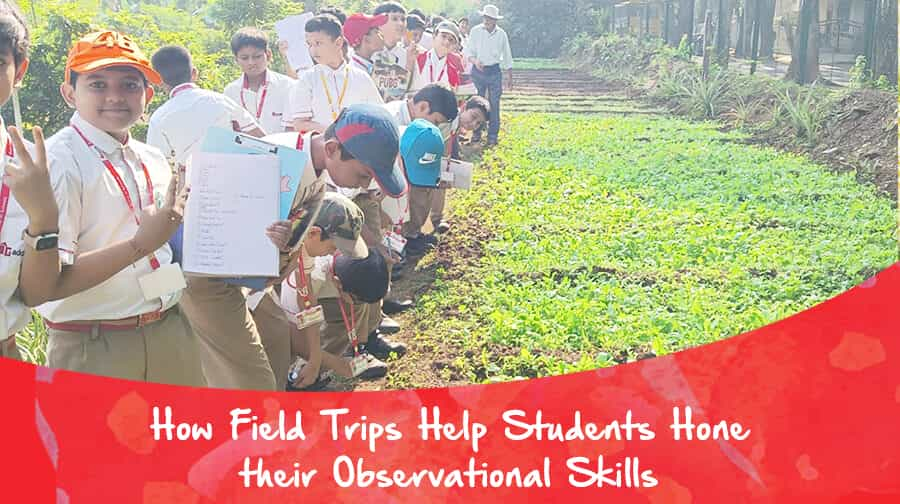Have you ever taken a field trip during your schooling years? Field trips are exciting opportunities to explore the world outside the traditional classroom setting. They take us to places we may never have seen otherwise, providing exposure to real-life examples of concepts and skills learned in school.
The fun aspect aside, did you know that field trips also play a vital role in developing observation skills? Observation is the process of noticing and noting aspects of our environment, and good observation skills are essential to success in both academic and personal settings. In this blog, we’ll explore how field trips help students hone their observation skills to become better learners, decision-makers, and leaders.
What are Observational Skills and why are they important?
Observation skills are important in many areas of life, including education, science, healthcare, and beyond.
- For instance, in scientific research, observation skills help scientists to notice patterns or anomalies that might lead to new discoveries.
- In healthcare, observation skills are crucial in diagnosing patients, monitoring their progress, and detecting changes that might suggest a need for further investigation.
- In an academic setting, observation skills can play a vital role in subjects such as art, music, and language learning.
- In art, students need to observe what they are drawing accurately and translate these observations onto paper.
- In music, students must observe the notes and timing to play the piece correctly.
- In language learning, students must observe the correct pronunciation and sentence structures to master the language.
Beyond the classroom, strong observation skills can help individuals make informed decisions, stay safe, and thrive in their personal and professional lives. For example, in the workplace, observation skills are essential for identifying potential workplace hazards and finding new solutions to challenges.
In everyday life, observation skills can help individuals to accurately read social cues, notice changes in their environment, and avoid potential dangers. In summary, strong observational skills are critical for success both inside and outside the classroom. Students who develop strong observation skills are better equipped to learn, problem-solve, and navigate the complex world around them.
How do Field Trips benefit Observation Skills?
Field trips provide many opportunities for students to develop observational skills in a way that is difficult to achieve in a traditional classroom setting. Here are some specific examples of how field trips can benefit observation skills:
- Science Museums: Science museums are great places for students to practise their observation skills. For example, a museum exhibit on the human body can help students learn about different parts of the body while observing the physical structure of organs, skeletal systems, and other body parts.
- Art Museums: Art museums provide students with an opportunity to observe different art styles, techniques, and materials. Viewing artwork allows them to closely observe the lines, textures, and details of art pieces and interpret the meaning behind them.
- Zoos and Aquariums: Visiting zoos and aquariums provides students with the opportunity to observe and learn about different animal species’ features, behaviours, and habitats. For example, observing how different animals interact with their environment can help students understand their social organisation and unique species adaptations.
- Botanical Gardens: Botanical gardens allow students to observe different plant species and learn about the plant life cycle, adaptations, and pollination processes. In the garden, students can exercise their observation skills by noticing plant textures, colours, and patterns and observing the relationship between plants and other organisms.
In a nutshell, field trips can benefit observation skills by immersing students in different settings and providing them with an opportunity to observe different subjects in real-life contexts. This approach helps them develop observation skills through sensory observations, self-discovery, and collaboration with peers.
Conclusion
Field trips offer an excellent opportunity for students to practise and develop their observation skills by taking them out of the classroom and immersing them in real-life contexts. Through field trips, students can draw on multiple senses, collaborate with peers, and practice self-discovery, all of which help them develop strong observation skills that are critical for success both in academic and personal settings.
At Radcliffe School, we understand the importance of field trips. That’s why we conduct two field trips every year that expose our students to diverse environments, allowing them to explore and enhance their observation skills. Our field trips are carefully curated to provide our students with a unique learning experience that broadens their perspectives and helps them apply their knowledge to real-life problems.
If you’re a parent looking for a school that values experiential learning and hones the observation skills of its students, Radcliffe is the right choice for you. Get in touch with us today to learn more about our unique approach to education and to schedule a tour of our school.




